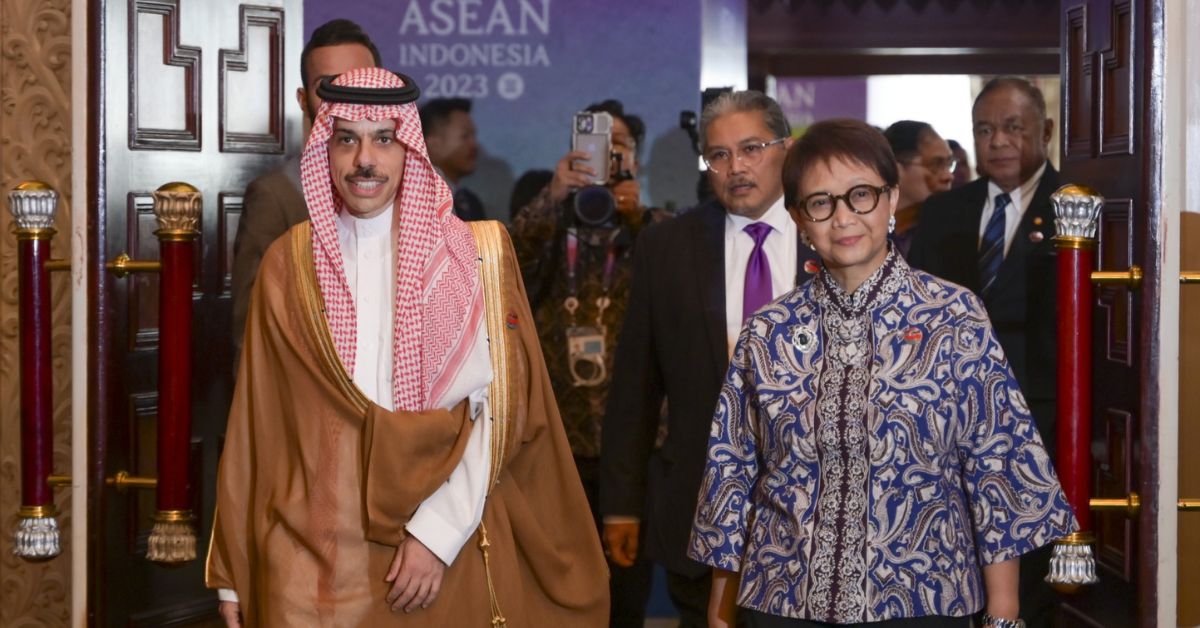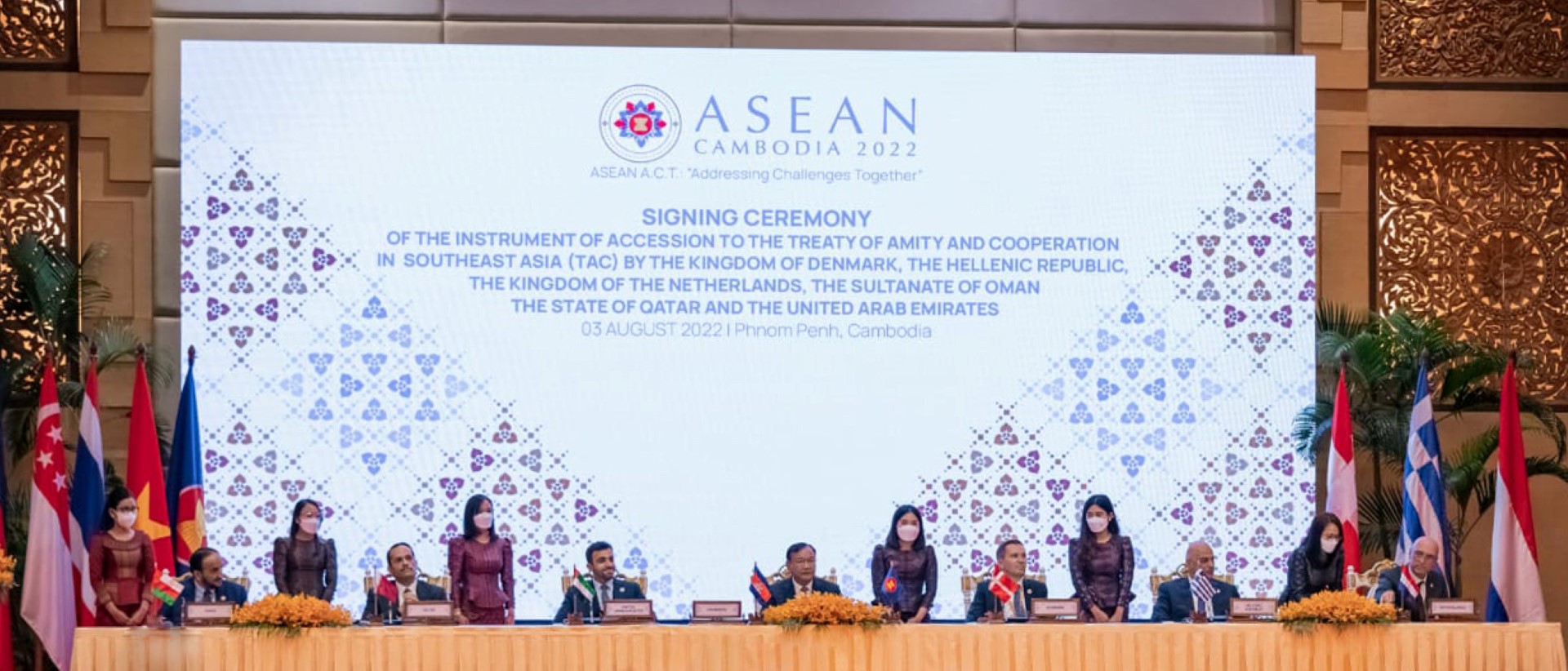DUBAI, UAE — Trade and economic relations between the Gulf Cooperation Council (GCC) and the Association of Southeast Asian Nations (ASEAN) are entering a new phase. This new era of collaboration comes after a period where trade more than doubled, leading to ASEAN’s ascension as one of the GCC’s most crucial trading partners.
The GCC’s eastward shift resulted in strategic partnerships with Asian giants like China and India. However, experts suggest that its relationship with ASEAN remains untapped and could provide further growth opportunities.
The geopolitical and economic bloc, ASEAN, includes Brunei, Cambodia, Indonesia, Laos, Malaysia, Myanmar, the Philippines, Singapore, Thailand, and Vietnam. Founded in 1976, it has been a magnet for increasing global attention due to its economic dynamism and strategic relevance in the Indo-Pacific region.
In a bid to enhance Gulf-Asian relations, Saudi Arabia recently became the 51st country to sign the Treaty of Amity and Cooperation (TAC) with ASEAN in the Indonesian capital, Jakarta. This came on the heels of similar moves by Qatar, Oman, and the UAE in August 2022, signaling a trend towards greater collaboration.

The TAC is a peace treaty among Southeast Asian countries. It emphasizes non-interference in the internal affairs of others, peaceful dispute resolution, and the prohibition of the use of threat or use of force. Cambodia’s Foreign Minister Prak Sokhon has encouraged all treaty signatories to deepen friendly relations and mutually beneficial cooperation with ASEAN.
Beyond the realm of diplomacy, both sides eye expanding trade and investment exchanges and opening new economic horizons. A recent analytical report by the Dubai Chamber in collaboration with The Economist underscored the commercial opportunities available in the post-Covid-19 era.
The report highlighted several sectors ripe for cooperation, such as foodstuffs, agriculture, retail trade, e-commerce, technology, financial services, transportation, and logistics. Despite the geographic distance and diverse development paths, the Gulf and ASEAN share a common need for economic diversification and sustainable growth.
According to the Emirates News Agency (WAM), the UAE stands at the forefront of Gulf investments in the ASEAN region. It accounted for 74 percent of investments worth approximately US$13.4 billion between January 2016 and September 2021. Conversely, ASEAN investment in GCC countries was substantially lower, at an estimated US$3.6 billion during the same period, with Singapore taking the lead.
GCC-ASEAN relations at a glance * Trade between GCC and ASEAN has more than doubled in recent years, cementing ASEAN as a significant trading partner for GCC countries. * Saudi Arabia has recently become the 51st country to sign the Treaty of Amity and Cooperation (TAC) with ASEAN. * In August 2022, Qatar, Oman, and the UAE also signed the TAC, indicating a strengthening of Gulf-Asian relations. * The UAE leads Gulf investments in the ASEAN region, accounting for 74 percent of the total, equating to approximately US$13.4 billion from January 2016 to September 2021. * ASEAN investment in GCC is lower, at an estimated US$3.6 billion over the same period, with Singapore accounting for two-thirds of this investment. * Electronics and machinery are the most imported commodities by Gulf countries from ASEAN, making up 28 percent and 12 percent of the US$144 billion import value from 2016 to 2020, respectively. * Only 2 percent of the total imports of Southeast Asian countries came from the Gulf countries between 2016 and 2020. * Southeast Asian countries accounted for only 4 percent of total Gulf exports, amounting to US$ 126 billion, with crude oil making up 43 percent and plastic polymers 20 percent. * The UAE and Indonesia, and Singapore and the GCC, have signed free trade agreements to strengthen economic ties. * The digital economy is expected to drive growth in ASEAN's main sectors and provide common ground for strengthening future cooperation between the Gulf countries and ASEAN. * Increased Gulf investments in ASEAN countries could lead to more substantial economic growth in those countries and allow for signing oil and gas contracts with Gulf countries.
Trade between the two regions reveals an interesting dynamic. While the GCC primarily imports electronics and machinery from ASEAN, the Southeast Asian bloc imports crude oil and plastic polymers from the Gulf. Experts believe there is untapped potential for further trade diversification.
The push to strengthen ties culminated in a historic free trade agreement between the UAE and Indonesia, which followed a similar agreement between Singapore and the GCC. These agreements signify a broadening horizon of cooperation between one of the Gulf’s largest economies and Southeast Asia’s most significant economy.
The digital economy, a focus of the Dubai Chamber report, presents another vibrant field for collaboration. As digital transformation reshapes global markets, ASEAN’s burgeoning digital economy could stimulate growth and provide a platform for GCC companies to expand their footprint.
The report concluded that deeper economic integration could lead to significant economic growth in ASEAN countries and facilitate oil and gas contracts with Gulf nations, ensuring steady supplies, particularly during times of crisis.
As GCC and ASEAN explore common ground, their relationship could set a precedent for economic partnerships between different regions. By recognizing mutual interests and leveraging their respective strengths, both blocs could drive sustainable economic growth and development.








